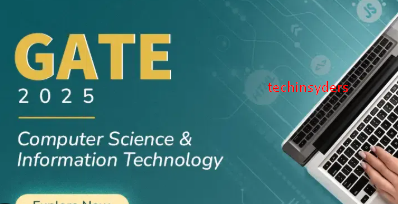What is Computer Networking?
Why is Computer Networks Important for GATE 2025?
- Weightage in GATE: Computer Networks typically accounts for 8-10 marks in the GATE exam, making it a critical subject to focus on.
- Real-World Applications: The concepts you learn are directly applicable to real-world scenarios, such as network design, troubleshooting, and optimization.
- Interdisciplinary Connections: Topics like Operating Systems, Distributed Systems, and Security are closely related to Computer Networks, making it a core subject for understanding other areas.
GATE 2025 Computer Networks Syllabus
- Network Fundamentals:
- OSI and TCP/IP models
- Network topologies
- Switching techniques (circuit, packet, and message switching)
- Data Link Layer:
- Error detection and correction
- Flow control and ARQ protocols
- MAC protocols (ALOHA, CSMA/CD, CSMA/CA)
- Network Layer:
- IPv4 and IPv6 addressing
- Routing algorithms (Dijkstra, Bellman-Ford)
- Subnetting and supernetting
- NAT and DHCP
- Transport Layer:
- TCP and UDP protocols
- Congestion control (AIMD, slow start)
- Flow control mechanisms
- Application Layer:
- DNS, HTTP, FTP, SMTP
- Cryptography basics (SSL/TLS)
- Network Security:
- Firewalls
- Symmetric and asymmetric encryption
- Digital signatures and certificates
How to Prepare for Computer Networks in GATE 2025
1. Understand the Basics
Start by building a strong foundation in the basics of networking. Focus on understanding the OSI and TCP/IP models, as they form the framework for all networking concepts. Use standard textbooks like “Computer Networking: A Top-Down Approach” by Kurose and Ross for in-depth explanations.
2. Focus on High-Weightage Topics
Prioritize topics that are frequently asked in the GATE exam. These include:
- Routing algorithms
- Error detection and correction
- TCP/IP protocols
- Subnetting and addressing
3. Practice Numerical Problems
Numerical problems, such as subnetting, CIDR, and routing table calculations, are common in GATE. Practice these regularly to improve your speed and accuracy.
4. Use Online Resources
Leverage online platforms like NPTEL, GeeksforGeeks, and YouTube tutorials for additional explanations and problem-solving techniques. Many of these resources are free and tailored for GATE aspirants.
5. Solve Previous Year Papers
Solving previous year GATE papers is crucial for understanding the exam pattern and the type of questions asked. Analyze the solutions to identify your weak areas and work on them.
6. Take Mock Tests
Enroll in a GATE test series to simulate the exam environment. Mock tests help you manage time effectively and build confidence.
Common Mistakes to Avoid
- Skipping Basics: Many students jump to advanced topics without mastering the basics, leading to confusion later.
- Ignoring Numerical Problems: Numerical questions are scoring, so don’t neglect them.
- Lack of Revision: Regular revision is essential to retain concepts and formulas.
- Over-Reliance on Shortcuts: While shortcuts can save time, understanding the underlying concepts is crucial for solving tricky questions.
Top Resources for Computer Networks Preparation
- Books:
- “Computer Networking: A Top-Down Approach” by Kurose and Ross
- “Data Communications and Networking” by Forouzan
- Online Courses:
- NPTEL lectures on Computer Networks
- Coursera and Udemy courses on networking fundamentals
- Practice Platforms:
- GeeksforGeeks
- GATE Overflow
- Testbook and Gradeup for mock tests
